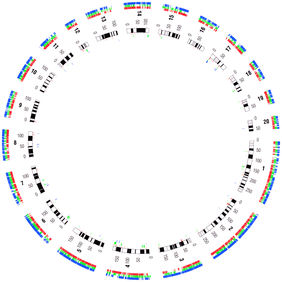Laboratory rats are particularly suited for analyzing the genetic causes of epidemiological-relevant diseases. For over 150 years, scientists have been using laboratory rats as model animals in clinical research laboratories. It is known that the DNA sequence of every organism shows natural variations called “single nucleotide polymorphisms” or SNPs. Typically, the genome of an individual has several million SNPs and, thus, he or she differs at this level from others within the same species. Scientists investigate these SNPs to clarify whether they are linked to or influence the development of certain diseases. The MDC researchers and their colleagues in Europe and Japan have now identified three million SNPs in the genome of the rat. Thus, they were able to expand and improve upon the existing genomic map which until now was based on the analyses of only three rat strains.
FLI is a member of the STAR-consortium.
Publication
STAR Consortium, Saar K, Beck A, Bihoreau MT, Birney E, Brocklebank D, Chen Y, Cuppen E, Demonchy S, Dopazo J, Flicek P, Foglio M, Fujiyama A, Gut IG, Gauguier D, Guigo R, Guryev V, Heinig M, Hummel O, Jahn N, Klages S, Kren V, Kube M, Kuhl H, Kuramoto T, Kuroki Y, Lechner D, Lee YA, Lopez-Bigas N, Lathrop GM, Mashimo T, Medina I, Mott R, Patone G, Perrier-Cornet JA, Platzer M, Pravenec M, Reinhardt R, Sakaki Y, Schilhabel M, Schulz H, Serikawa T, Shikhagaie M, Tatsumoto S, Taudien S, Toyoda A, Voigt B, Zelenika D, Zimdahl H, Hubner N. SNP and haplotype mapping for genetic analysis in the rat. Nat Genet.2008, 40(5), 560-6. doi: 10.1038/ng.124.









